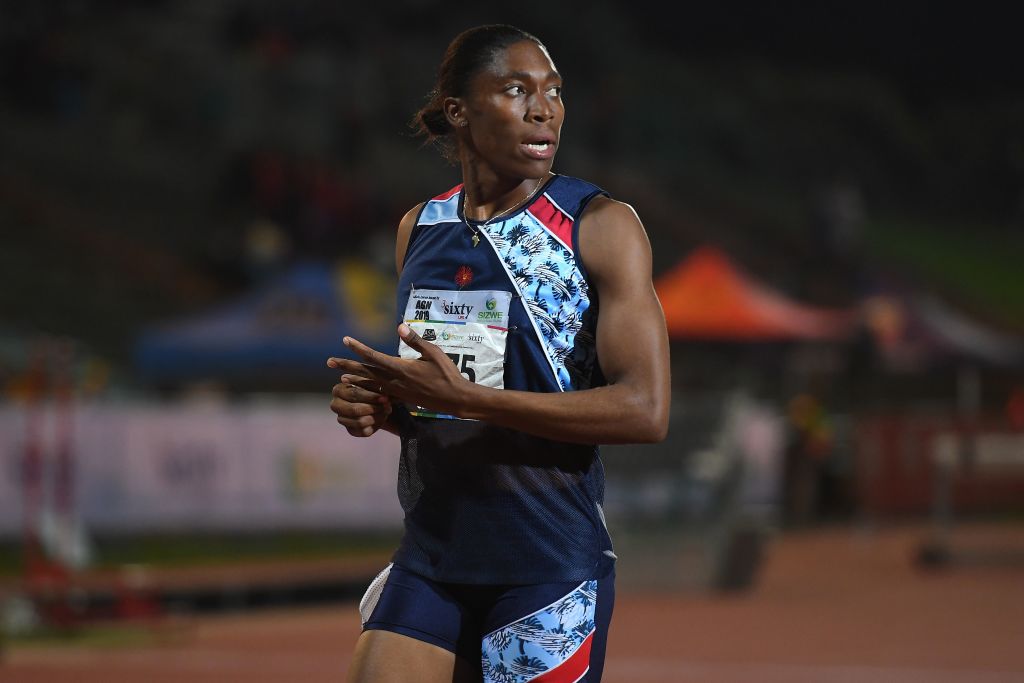Doctors and athletes are debating new restrictions on South African runner Caster Semenya's testosterone levels


A free daily email with the biggest news stories of the day – and the best features from TheWeek.com
You are now subscribed
Your newsletter sign-up was successful
South African middle-distance runner Caster Semenya, who has two Olympic gold medals in the 800-meter competition, received news on Wednesday that could severely alter the course of her illustrious career — and it's already stirred quite a debate in the sports world.
Semenya had appealed a new rule instituted by the International Association of Athletics Federation which would force female runners like Semenya, who have naturally elevated levels of testosterone, to take testosterone blockers to compete in races from 400 meters to a mile. But the Court of Arbitration for Sport denied the appeal, which means the 28-year-old Semenya will either have to take the medication or stop competing altogether. Either way, the ruling is surely a blow to one of the sport's most gifted athletes just one year before the next Olympics.
Some observers, including famed American sprinter Michael Johnson, said that while it was no fault of Semenya's, the court's ruling was the only way to ensure fair competition.
The Week
Escape your echo chamber. Get the facts behind the news, plus analysis from multiple perspectives.

Sign up for The Week's Free Newsletters
From our morning news briefing to a weekly Good News Newsletter, get the best of The Week delivered directly to your inbox.
From our morning news briefing to a weekly Good News Newsletter, get the best of The Week delivered directly to your inbox.
Semenya has plenty of supporters, however, especially in her home country of South Africa. Several analysts have also pointed out that biology creates advantages for athletes in nearly every sport. USA Today's Nancy Armour, for example, asks what the reaction would be if legendary U.S. swimmer Michael Phelps was banned from competing because of his preternaturally long wingspan.
Others say the IAAF's decision could have other consequences beyond athletic records: One doctor says it could ultimately be a choice between competing and caring for her mental health. Tim O'Donnell
A free daily email with the biggest news stories of the day – and the best features from TheWeek.com
Tim is a staff writer at The Week and has contributed to Bedford and Bowery and The New York Transatlantic. He is a graduate of Occidental College and NYU's journalism school. Tim enjoys writing about baseball, Europe, and extinct megafauna. He lives in New York City.
-
 Quentin Deranque: a student’s death energizes the French far right
Quentin Deranque: a student’s death energizes the French far rightIN THE SPOTLIGHT Reactions to the violent killing of an ultra-conservative activist offer a glimpse at the culture wars roiling France ahead of next year’s elections.
-
 Secured vs. unsecured loans: how do they differ and which is better?
Secured vs. unsecured loans: how do they differ and which is better?the explainer They are distinguished by the level of risk and the inclusion of collateral
-
 ‘States that set ambitious climate targets are already feeling the tension’
‘States that set ambitious climate targets are already feeling the tension’Instant Opinion Opinion, comment and editorials of the day
-
 Nobody seems surprised Wagner's Prigozhin died under suspicious circumstances
Nobody seems surprised Wagner's Prigozhin died under suspicious circumstancesSpeed Read
-
 Western mountain climbers allegedly left Pakistani porter to die on K2
Western mountain climbers allegedly left Pakistani porter to die on K2Speed Read
-
 'Circular saw blades' divide controversial Rio Grande buoys installed by Texas governor
'Circular saw blades' divide controversial Rio Grande buoys installed by Texas governorSpeed Read
-
 Los Angeles city workers stage 1-day walkout over labor conditions
Los Angeles city workers stage 1-day walkout over labor conditionsSpeed Read
-
 Mega Millions jackpot climbs to an estimated $1.55 billion
Mega Millions jackpot climbs to an estimated $1.55 billionSpeed Read
-
 Bangladesh dealing with worst dengue fever outbreak on record
Bangladesh dealing with worst dengue fever outbreak on recordSpeed Read
-
 Glacial outburst flooding in Juneau destroys homes
Glacial outburst flooding in Juneau destroys homesSpeed Read
-
 Scotland seeking 'monster hunters' to search for fabled Loch Ness creature
Scotland seeking 'monster hunters' to search for fabled Loch Ness creatureSpeed Read
